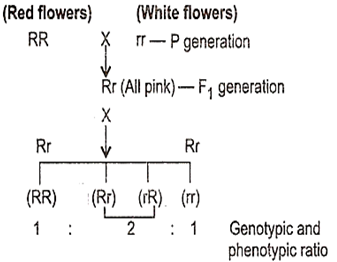 Multiple Choice Questions
Multiple Choice QuestionsWhich of the following is not related to sex chromosome X or Y?
Turner's syndrome
Klinefelter's syndrome
Down's syndrome
Haemophilia and colour bindness
A normal woman is married with a man having hypertrichosis condition. They got one daughter and one son. What is the possibility of this daughter to have hypertrichosis condition?
0%
25%
50%
100%
A woman has a haemophilic son and three normal children. Her genotype and that of her husband with respect to this gene would be
XX and XhY
XhXh and XhY
XhXh and XY
XhX and XY
The trisomy for 21st chromosome is called
Down's syndrome
Turner's syndrome
Sickle cell anaemia
Klinefelter's syndrome
1 : 2 : 1 phenotypic and genotypic ratio is found in
complementary genes
blending inheritance
multiple alleles
pseudo alleles
B.
blending inheritance
Incomplete dominance or blending inheritance was first seen in Mirabilis jalapa (4'O clock plant). Here when red flowers are crossed with white flowers variety the F1 hybrid is pink and F2 ratio is 1 red : 2 pink : 1 white.

Tay Sach's disease is due to
sex linked recessive gene
sex linked dominant gene
autosomal dominant gene
autosomal recessive gene
A colourblind mother and normal father would have
colourblind sons and normal/carrier daughters
colourblind sons and daughters
all colourblind
all normal
